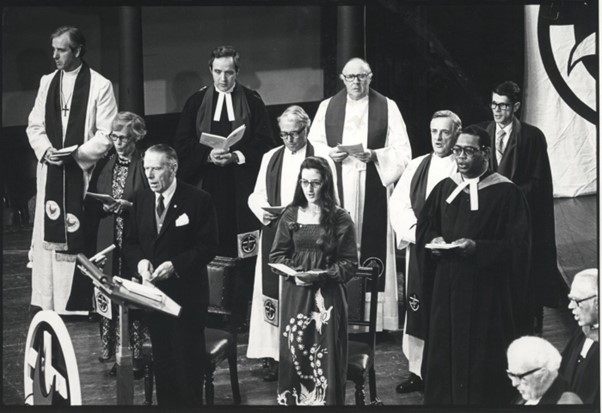This sermon was given on 11 September at St Stephen’s Uniting Church at 10am. At 12:30pm the Proclamation for the King took place outside NSW Parliament House outside the church. This is not an essay.
Good morning Friends,
I speak on Gadigal Land of the Eora nation, unceded land, unceded to the British crown. A fitting and important reminder on a day such as this.
Two days ago your mischievous Rev. Ken Day asked me to speak this morning. So I pray to God… ‘may my words be aligned with your will oh God, guard the door of my mouth, Amen’
My name is David Barrow, I worship at Leichhardt Uniting Church, and I have the great honour of working with you and your wonderful ministry team as the Lead Organiser of the Sydney Alliance. An Alliance that holds St Stephen’s in very high regard, and gratitude for the space, fellowship, leadership and resources that you create for the people of this city.
Today we are in our third day of grieving. The shock has subsided and now we are beset by reflection and melancholy.
I will spare you grand eulogising and leave that to others. My hope from my words is to bring together some thoughts of worth that can help us as Christian leaders in our families, communities and workplaces, understand and make sense of our conflicting feelings and duties as Christians in this moment.
As such my words have three parts.
The present; our moment of grief
The past and the empire
The future — putting our grief to work.
The present; our moment of grief.
As our Prime Minister said, “There is comfort to be found in Her Majesty’s own words: ‘Grief is the price we pay for love’.”
I did not expect to shed a tear. I am a progressive millennial. And yet on Friday morning I am crying in the kitchen over a person I have never known.
The thing that inspired me most about the Queen was her personal humility and commitment to public service. How lucky we have been to observe someone of her calibre, discipline and Christian values, albeit private form, in our lifetimes.
In an age of celebrity and rampart capitalism her personal conservatism has demonstrated an alternative set of values.
Paul Keating, avid republican as he is, wrote some beautiful words
‘In the 20th century, the self became privatised, while the public realm, the realm of the public good, was broadly neglected.
“Queen Elizabeth understood this and instinctively attached herself to the public good against what she recognised as a tidal wave of private interest and private reward and she did this for a lifetime. Never deviating.
She was an example of public leadership, married for a lifetime to political restraint. Remaining always, the constitutional monarch”.
A set of values and type of leadership sorely missed and needed in conservative political expressions across the Anglosphere.
I suspect we will mourn her passing partly because we see in her, a way of being of a generation that has truly passed.
Her behaviours, values and ways remind us of the best of our passed grandparents and great-grandparents- of teachers, church elders and others that were present at the beginning of our lives.
People we loved for their consistency, personal humility and commitment to public service.
We do not just grieve Queen Elizabeth, we grieve the loss of those that inspired us; that embodied those values. The many women, and men, of our childhoods who we looked up to, who taught us the way of the common life.
You’re still in church in 2022, how great their influence must have been on you!
For me it was my Gran, Dwyllis Barrow, a true lady of Lindfield Anglican, a patient, kind but firm woman. Manners mattered because they showed respect and love for others, she had a tough minded intellect and a certain way of doing things that came from growing up in The Depression, she had a quiet faith that reached out to me with acceptance and Christian love when I came out as a gay man, only months before she passed away.
Who was it in your life?
Take a moment to reflect on those of that generation whom we are deeply grieving. Who is it for you? Picture them.
Pause for reflection
‘Grief is the price we pay for love’
It is not only that we grieve for her as a person, or for them as people. We grieve the constancy and reassurance that we all have craved, craved since being children.
That everything we have ever known has changed, nothing remains as it was, not even the weather or the seasons are the same. We’ve grown up, grown old, grown wrinkles. We have supercomputers in our pockets and the world news moves at a faster pace than ever. The horizon is clouded with wars and rumours of wars.
And through it all, there was one constant, and it was that, she. was. there.
We grieve that that time passes.
How much does this deeply touch us, and our faith! Isn’t that what we seek in our faith? The constancy and steadfastness of God?
Ecclesiastes 3:11-
God has made everything beautiful in its time. God has also set eternity in the human heart; yet no one can fathom what God has done from beginning to end.
We grieve because time passes, Like the feeling of immense stillness and meaning we can sometimes feel as we see the afternoon light, the golden hour fade into evening. We feel the fleetingness of our time on this planet. That awe when rightly applied realigns our lives to meaning, our actions to impact – and we plant seedlings for our grandchildren.

It is different from the feeling of nostalgia. Nostalgia is aching for home. Unhealthy expressions of it lead to reactionary, cruel politics that close our hearts to those seeking change — as we idealise a past that was perhaps never as good as we remember.
The antidote to nostalgia and the passiveness that can come from experiencing the loss of the past?
It is how time is spoken of in the New Testament, the Kairos, the momentousness of the kingdom of God. The very real present!
In a funny way the Queen and her technicoloured wardrobe of her golden years, teach us about Kairos. In her later season of life, she wore bright pink, green, and blue- she was not relegated to beige. Each day, each public visitation — was a moment of life. A moment to express the vitality and love of God.
It is a sentiment that I will return to.
We grieve for the good human woman, who like us, was no saint.
We grieve for those like her
And we grieve that time passes.
The Past — the empire
At midday there will be a grand pronouncement outside as the death of the Queen becomes the proclomation of the King and engenders the political and constitutional machinery of the state and government.
It is possible to respect the person, even the constitutionally restrained position, without desiring monarchy and certainly not the empire that it represented in the past.
The discordance will grow over the weeks to come, as the stories of the empire emerge in public discourse. We will be seeing and hearing from those around the world that do not share our moment of grief for the monarch, but who’s grief is much closer to home, about the losses of life, livelihood and culture to a violent state that was built in her name and that of her predecessors. It was experienced in their lives, lives of their parents or grandparents. The people of Ireland, and the peoples of Africa, India, Asia and here in the Pacific and Aboriginal Australia.
As a Christian, I do not lay my trust in kings, not in queens, nor in powers or, principalities, princesses, politicians or presidents. I trust no humans who have through wealth or guile, inheritance or luck accrued great and terrible power.
As Christians, we are not in fact called to monarchy, nor to hereditary rule. As Thomas Paine the American Independence writer of Common Sense argued; the ancient Hebrew Testament had no love for Kings, theirs was a tradition of judges and elders, it was not a Hebrew invention, but one inherited from those around them — and God warned them of kings and their excesses.

How easy it is for us humans to give our faith, our love, to human constructions of pomp and circumstance.
And then we come to our New Testament.
They were tending their nets, fishing, labouring, doing the accounts. They put down their tools, in their towns and villages and followed this young man.
And they would set out on the dirt path toward the centre of theological and political power — Jerusalem.
And such is the easiness of succumbing to the powers and principalities, that we see in the reading today that Jesus rebuked his own boys, his own team, his own disciples, Mark 10:41—
“You know that among the Gentiles those whom they recognize as their rulers lord it over them, and their great ones are tyrants over them”
And they did not trust in Pharisees, or Sadducees, or wealthy kings with famous names like Herod, nor in the elegant and educated, but violent, Roman military that occupied their land.
They put not their faith in swords, real for killing, or ceremonial for knighting. Fine clothes, tradition or convention. But rather love embodied in the man called Jesus, the Messiah.
It is to that man, who lived and liberated, who was executed violently at the hands of the imperial state on the town garbage dump and who rose again and was the saviour of all things, of the universe — in him, we put our humble trust.
That humble trust was abused when the church shacked up with the empire in 300 AD in the Constantinian assumption. With Constantine the emperor— the great sin of Christendom, the great lie, was that state violence was compatible with the radical commonwealth of Love of Christianity.
That Christendom, allowed the triangle of racism, violence and capital to build a British empire of steam and steel, built on the backs of slaves, indentured wealth and the plundering of continents by companies and colonists blessed by the monarchy. That it was in the name of the crown, — that diadem that sat on the head of the monarch- that we saw the theft and destruction of the lands and culture of this great continent and its first peoples of time immemorial. (**Lands and cultures that survive and thrive today in spite of the empire.)
And let us remember as we read the various voices espousing online and in the papers — that we here are no Church of England (though perhaps some of you are visiting Anglicans in which case — good morning and welcome!); before the Uniting Church was formed, our ancestors were Wesleyan abolitionists, coal workers in Welsh congregationalist churches, or independent minded and sometimes bitter Scots Presbyterians — our own tradition has been deeply sceptical of Westminster and London and the excesses of human constructions, of unchallenged wealth and empire.

1977 Uniting Church in Australia forms out of three contrarian churches — Methodist, Congregationalist, and (most) Presbyterians.
We reject that empire. We are not of that empire. We are not of the empire of the union jack, nor of the southern cross (pointing at the heritage listed Australian and British flags hanging in the church) God’s realm of love has no palaces and no flags.
We put our humble faith in the kingdom of God
(At this point God Save the King started playing from the street outside St Stephen’s in what was described by one listener as ‘extremely diegetic!, I exclaimed “Empire is everywhere!)
Perhaps the power of Queen Elizabeth’s faith was that she, a rich and powerful inheritor of the empire, put her own humble trust in God.
Hers was a conservative faith, it did not challenge power, though there were moments of great human generosity through her life that will be explored and debated by both the critics and the sycophants — and all of us in-between — in days and years to come.
Her humble faith and her restraint made her the exception to the line of queens and kings.
(Note for those reading this is not an essay on the actual nature of the English Civil war, parliament and constitutional monarchy)
So how do we hold these two ideas in tension?
Love and grief for the person and rejection of the empire she inherited and whom the monarchy enabled and represented?
Future – putting it to work
I thank God for our humble, stumbling Uniting Church — that we can do two things at once.
Let us bring all these threads together.
The best traits of Queen Elizabeth, and her generation epitomised calm amongst great change, constancy and generosity.
Such virtues help us as we consider the disruptive world around us, and provide us with a steadfastness that allows us not to see ourselves as victims of change, resisting with frustration and acting out of misplaced nostalgia.
Instead we embrace the moment of our lives, the Kairos of the kingdom of God. That in our elder years we can wear the bright yellow gown, that is, our time is not yet up! Our moment is not yet passed! We too can act!
The Queen’s public life was restrained; and whether by the constitution or her personal nature, she did not question or challenge structures of power.
We can, in fact as Christians who follow the life, death and resurrection of Jesus of Nazareth our Messiah, we must! We are called to it.
We have inherited the wealth and privilege of a violent British empire with monarchy at its heart.
We are now in a moment of national identity and history and I do not mean in the question of the republic! That is a sideshow! Regarding the Republic we as struggling Christians here in Sydney will have very little influence- perhaps not more than a vote amongst millions in a future and abstract referendum.
No, instead I speak of the invitation to walk together with First Nations towards treaty, truth and a voice to Parliament.

Let our love for Queen Elizabeth’s service inspire us towards this public good.
It is a shame that Queen Elizabeth never got to see Australia make treaty. For I believe she would have helped us see its importance and inspire in us grace for the task.
In God there will be the reconciliation of all things, let that promise inspire us to seek the true reconciliation of our history and the peoples on this continent.
In this my darling St Stephen’s we can have so much influence, and you here already have — hosting the Uluṟu Statement training of many Sydneysiders downstairs. The Uluru Statement that undergirds these hopes for our future.
Every person in this church today, no matter their age –through conversation and community leadership will have more power to see the realisation of this work — than the new King of England.
This work is good Christian work, it both stretches over a lifetime of dutiful service and rests in the exciting, momentous, ever-present now.
Let us put our grief and love to work.
In the name of God, Amen.
David Barrow
This sermon was originally published on Medium. View the original post here.












